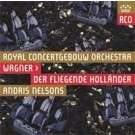|
Back
03/14/2015
Richard Wagner: Der fliegende Holländer
Terje Stensvold (Der Holländer), Anja Kampe (Senta), Kwangchul Youn (Daland), Christopher Ventris (Erik), Russell Thomas (Der Steuermann), Jane Henschel (Mary), Chor des Bayerischen Rundfunks, NDR Chor, Martin Wright (chorus master),
WDR Rundfunkchor Köln, David Marlow (chorus master), Koninklijk Concertgebouworkest, Andris Nelsons (conductor)
Recorded live at the Concertgebouw, Amsterdam (May 24 & 26, 2013) – 136’
2 CDs RCO Live RCO 14004 – Notes and libretto in German, English, and French

   
For the most part this is a dazzling performance and it must have been a very exciting event to have attended. However it falls somewhat beneath its own impressive standard in the casting of two of the principals, namely the title role itself and Daland.
Norwegian baritone Terje Stensvold is right decent in the role but the occasion calls for something beyond. Bass Kwangchul Youn displays a pronounced beat (I realize everyone is working hard in this live performance) and his bass is of the rather light variety - he and Stensvold sound too much alike. He sings his Act II aria ”Mögst du, mein kind” very nicely, however.
Anja Kampe is absolutely rivetting as Senta, her brilliant tone encompassing the full drama of the role. The Senta-Erik confrontation in Act II is blazing; Christopher Ventris is luxury casting as Erik. The other two roles - Russell Thomas as the Steersman and Jane Henschel as Mary - are extremely well sung.
For the chorus work, the orchestra imported three (yes, THREE) of the top German radio choirs - from Munich, Cologne and Hamburg. Aside from the first appearance of the Dutchman’s ghost crew being almost inaudible, the choruses are totally superb, especially when the two groups of sailors face off near the end.
Some might argue that Andris Nelsons calls too much attention to himself and the amazing orchestra, such as at the end of the overture when he holds some phrases so-o-o very long - but if you can do it, it’s thrilling. (And isn’t there a consensus that the Royal Concertgebouw Orchestra is the world’s best?) There are more breathtaking moments at the finale of Act I and then - as one would hope - at the very end, which is truly transcendental.
Michael Johnson
|